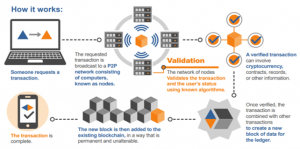 In the latest “World Energy Issues” Map produced by the Council, blockchain is identified as one of the most critical uncertainties within the digitalisation elements and is perceived by energy leaders globally to be an issue of both relatively high impact and uncertainty. Blockchain has the potential to change the way we arrange, record and verify transactions, with the underlying model shifting away from a centralised structure (exchanges, trading platforms, energy companies) towards decentralised systems (end customers, energy consumers interacting directly).
In the latest “World Energy Issues” Map produced by the Council, blockchain is identified as one of the most critical uncertainties within the digitalisation elements and is perceived by energy leaders globally to be an issue of both relatively high impact and uncertainty. Blockchain has the potential to change the way we arrange, record and verify transactions, with the underlying model shifting away from a centralised structure (exchanges, trading platforms, energy companies) towards decentralised systems (end customers, energy consumers interacting directly).
But there are still a number of uncertainties in the way of blockchain which still could limit or even stall its growth due to a combination of technological, regulatory and other practical challenges. Among the big questions surrounding blockchain are: Will its early potential translate into robust and reliable practical applications? How sure can we be that its promise of greater cybersecurity will be fulfilled and that it won’t introduce new, possibly bigger risks? Will industry-wide protocols and standards be needed before blockchain can become truly industry-wide and transformative rather than niche and fragmented? How far away is widespread deployment of blockchain in the energy sector? This White Paper is designed to start a dialogue on these questions and a number of other issues that are relevant to anyone concerned with the development of blockchain in the energy sector.

Energy is ahead of many other industries in adopting blockchain.
Behind financial services, the energy sector is among the most advanced in its current adoption of blockchain.
Expectations of disruption from blockchain are high.
All but one of the the senior executives that we interviewed as part of the preparation of this paper (93%) think that blockchain will be able to disrupt the functioning of the industry and contribute toward accelerating the speed of the changes taking place in the energy system such as decarbonisation and the move to more decentralised energy sources.
New business models lie ahead as the technology potentially speeds up decentralisation and disintermediation.
Blockchain is expected to lead to much more direct relationships between energy producers and consumers, and to strengthen the market participation opportunities for small energy providers and prosumers. In a decentralised energy system, blockchain could enable energy supply contracts to be made directly between energy producers and energy consumers, and for them to be carried out automatically.
Grid management, energy trading and P2P applications emerge as the most relevant use case categories.
The most promising applications for blockchain identified by senior executives were architecture for managing grids, energy trading, peer to peer trading platforms, payment systems (particularly those associated with renewable energy and electric vehicle charging).
Opinion divided on blockchain energy consumption.
Blockchain is potentially very energy-intensive, driven by very complex validation algorithms (particularly those used by Bitcoin). However newer blockchain platforms (e.g. Hyperledger) will operate at much lower energy costs. The senior executives interviewed were divided on whether blockchain will contribute to net energy saving or whether it will add to energy demand; 47% said energy would be saved in net terms while 40% anticipate it will increase overall energy consumption.
Blockchain remains early-stage and is not the only game in town.
Blockchain remains at a relatively early stage of development with most projects still at the pilot stage. It still has significant limitations compared to existing technology in many situations, such as energy trading, and there is also the potential for rival technologies to emerge and leapfrog blockchain
Regulatory concerns present an opportunity not an obstacle.
Regulatory concerns stood out as a significant obstacle in the view of two-thirds of the senior executives interviewed. But although blockchain presents regulatory challenges, its potential to deliver greater transparency, improve access to information and simplify regulatory reporting could offer the regulator to have a real-time access to data. Immutability of data is one of the key characteristics of blockchain technology and is also a strong plus for regulators and supervisory bodies.
Cybersecurity remains a key uncertainty.
There is ambivalence about the cybersecurity impact of blockchain. Nearly as many expect it will introduce new risks as think it will strengthen security. And these views were not necessarily in opposite camps. A third of those who felt it would strengthen cybersecurity also thought it would herald new cybersecurity risks in the future.
Future direction – blockchain could become a table stake for future market success but doubts remain.
There is momentum gathering behind blockchain in the energy sector. It carries many implications for a wide range of stakeholders – consumers, businesses, regulators and policy-makers. Already, nearly half of those interviewed are deploying blockchain in real customer contexts.
Source: “The Developing Role of Blockchain”, World Energy Council
